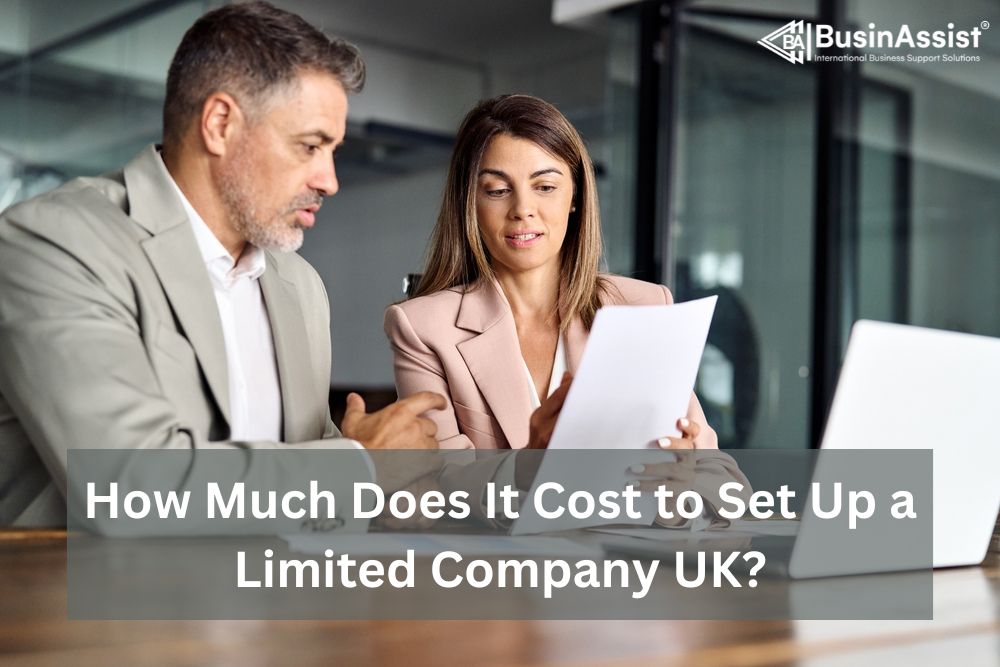Last Updated on December 18, 2025 by Joy Kyalo

The cost to set up a limited company in the UK varies depending on the type of business, where, and when an entrepreneur is setting up. There are many costs that entrepreneurs and business owners need to consider to set up their businesses in a successful way.
Business owners need to consider essential financial aspects associated with forming a limited company such as how much it will cost to register, periods of maintaining the entity, as well as tax implications.
In this article, we will highlight the overview of costs needed when forming a UK limited company, ongoing expenses, tax considerations, and ways to minimise expenses while increasing financial profits.
What are the costs of setting up a limited company?
Registration costs: Registration costs will depend on where the entrepreneur decides to register their UK limited company. Business owners who register with:
Companies House: Companies House fee is £50 for UK limited company incorporation (online). Postal application costs £71. If you decide to register your company via post, you will need to register for corporation tax within three months of starting to do business.
Company formation agents: The prices will vary considering the formation agent you choose. BusinAssist prices start at £50 inclusive of Companies House fees.
Accountants: They charge more than Companies House and Company formation agents. Their prices may differ depending on the accountant.
Global companies that do not have a UK address in the jurisdiction in which they want to incorporate their limited company, can purchase virtual offices that offer professional business addresses to register a company. Local companies can also rent a prestigious address for the privacy of their residential address. BusinAssist offers prestigious UK virtual office addresses from only £0.88 per week which comes with additional services such as mail handling, free UK bank accounts, and many more.
Other costs to be considered in the cost to set up a limited company include insurance, licenses, and permits.
What are the ongoing costs and maintenance of a limited company?
Annual filing fees:
UK limited companies must file statutory documents every year. Limited companies must file annual accounts with Companies House 9 months after the company’s financial year ends. This is a document that states the financial performance and activity of a company over the previous year.
A Confirmation Statement is a document that must be submitted to Companies House at least once every 12 months. This is a simple way of informing Companies House that the business details that they hold for your business are up to date.
BusinAssist helps UK limited companies file confirmation statements for only £12.
Limited companies pay Corporation Tax to HMRC 9 months and 1 day after your companies ‘accounting period for Corporation Tax ends. The tax rate is currently 19% (as of August 2024).
Filling dates can be checked on Companies House register under company overview.
Registered office address:
If you rent a registered office address in the UK, there will be a quarterly or annual fee. With BusinAssist, UK limited companies can rent our UK virtual business address and pay quarterly from (£12.87 to £90.87) or annually from (£ 45.76 to £ 273.00) depending on the package you purchase.
Accounting and bookkeeping costs:
The costs of accounting and bookkeeping may vary depending on a business account, payroll services, company size, and whether you hire a professional accountant or manage it yourself. The accountancy package may start from £40 – £100 per month.
Payroll and PAYE:
If you have employees, you’ll need to run payroll and deduct income tax and National Insurance contributions. Payroll software or an accountant’s services may incur costs.
VAT Registration (if applicable):
If your turnover exceeds the VAT threshold (currently £90,000), you’ll need to register for VAT. There are costs associated with VAT compliance and filing.
Insurance and Other Costs:
Consider business insurance (such as public liability insurance) and any other industry-specific costs. Insurance will shield your limited company from any potential financial disasters.
Technology and software expenses:
To stay ahead in this digital world, business owners should equip their limited companies with the latest technology and software tools. This will make it efficient for seamless operations and increase productivity. The cost of tech gadgets and software tools may vary depending on the type, your company size, and industry diversity.
Comparing costs of different business structures in the UK
Limited company vs. sole trader costs:
Choosing between a limited company and being a sole trader is somehow similar to choosing between an extravagant meal and a low-cost one. While it may be more expensive to establish and manage a limited company, the additional protection and status could justify the additional expenditure.
Limited company vs. partnership costs:
Are you thinking about going into a partnership as an alternative to setting up a limited company? Although partnerships may appear to be more affordable, keep in mind the fact that having much authority (alongside lots of income) means there are going to be lots of obligations – which can also lead to financial losses.
How to minimise costs when establishing a limited company
Utilising free or low-cost business tools:
Who said you need to break the bank to run a successful limited company? From free accounting software to budget-friendly project management tools, the internet is your oyster when it comes to saving those precious pounds.
Seeking tax efficiency strategies:
Why not explore tax efficiency strategies to keep more money in your pocket and less in the taxman’s. Explore R&D tax credits and other available reliefs.
What are the financial benefits of operating as a limited company?
Asset protection and limited liability:
Running a limited company is like wearing a financial bulletproof vest. If the worst happens, your personal assets are shielded from any financial fallout, giving you peace of mind to tackle business challenges head-on.
Access to tax planning opportunities:
Tax doesn’t have to be a four-letter word. As a limited company, you can unlock a treasure trove of tax planning opportunities that could help you save money and keep more of your hard-earned profits in your pocket.
Potential for growth and investment attraction:
Dreaming of taking your limited company to the big leagues? Being a limited company can make you more attractive to investors, lenders, and potential partners, opening up a world of growth opportunities that could see your business soar to new heights.
Conclusion:
In conclusion, the cost to set up a limited company in the UK is a significant factor that should be carefully evaluated by aspiring business owners. By understanding the financial implications, comparing costs with other business structures, and exploring ways to minimise expenses, entrepreneurs can make informed decisions that align with their budget and long-term business goals. Despite the initial investment required, operating as a limited company offers advantages such as asset protection, tax planning opportunities, and growth potential. With thorough planning and financial awareness, setting up a UK limited company can be a strategic step towards building a successful and sustainable business in the UK.
BusinAssist can help you incorporate your limited company in the UK at a very affordable cost. We also have virtual office services where companies and directors can rent our registered office address and service address respectively. The virtual office in London comes with additional services such as mail handling, 24/7 call answering services, free UK bank accounts, and many more.
For more information, contact us at info@businassist.com.
FAQs:
Q: How to set up a limited company in the UK?
Ans: Setting up a limited company in the UK involves simple steps that can be done online through Companies House website or with a company formation agent. Here is a step-by-step guide to help you:
- Choose a company name and check its availability on Companies House Company Name Availability Checker.
- Appoint at least one director and company secretary (optional).
- Identify people with significant control (PSC) and at least one shareholder.
- Prepare a memorandum of association and articles of association.
- Register your company with Companies House
Q: How long does it take to set up a limited company in the UK?
Ans: Establishing a limited company in the UK is quick. Normally, it will take about a day for your company to register at Companies House when registering online. However, if you decide to go with postal registration, expect 8 to 10 days before your company is formed.
Q: Why set up a limited company?
Ans: Setting up a limited company offers several advantages such as a limited liability. Shareholders’ and directors’ personal assets are protected and the company is liable for its debts. A limited company also enhances credibility and professionalism not forgetting that it can be more tax-efficient.
Q: How easy is it to set up a limited company?
Ans: In the UK, it is relatively easy to set up a limited company, particularly online registration which is streamlined and completed within 24 hours.
Q: What is needed to set up a limited company?
Ans: To register a UK limited company, business owner will need:
- Unique company name
- Company records
- Registered office address
- Memorandum of Association
- Article of Association
- Directors
- Shareholders
Read Also:
- A Step-by-Step Guide to Resign as a Director of a Limited Company
- Company Registration in Northern Ireland: How to Form Your Business the Right Way
- Company Registration Scotland: Your Complete Guide to Scottish Limited Company Formation
- Lost Your Government Gateway User ID and Password? Here’s How to Find Them
- How to Incorporate a Company in the UK: Key Steps and Requirements
- Everything You Need to Know About Companies House Default Address
- Difference Between a Sole Trader and a Limited Company Explained
- How to Register a Company in UK from India: Complete Guide
- How to Start a UK Ltd Company from Pakistan: Step-by-Step Guide
- Best Company Formation Agents in the UK 2025: Choose BusinAssist for a Smooth Start

The BusinAssist Editorial Team has 15+ years of experience writing about small business and company formation in the UK, Canada, and the USA. We simplify complex processes and provide practical insights to help entrepreneurs succeed. Business Assist with BusinAssist – your partner for business success.

